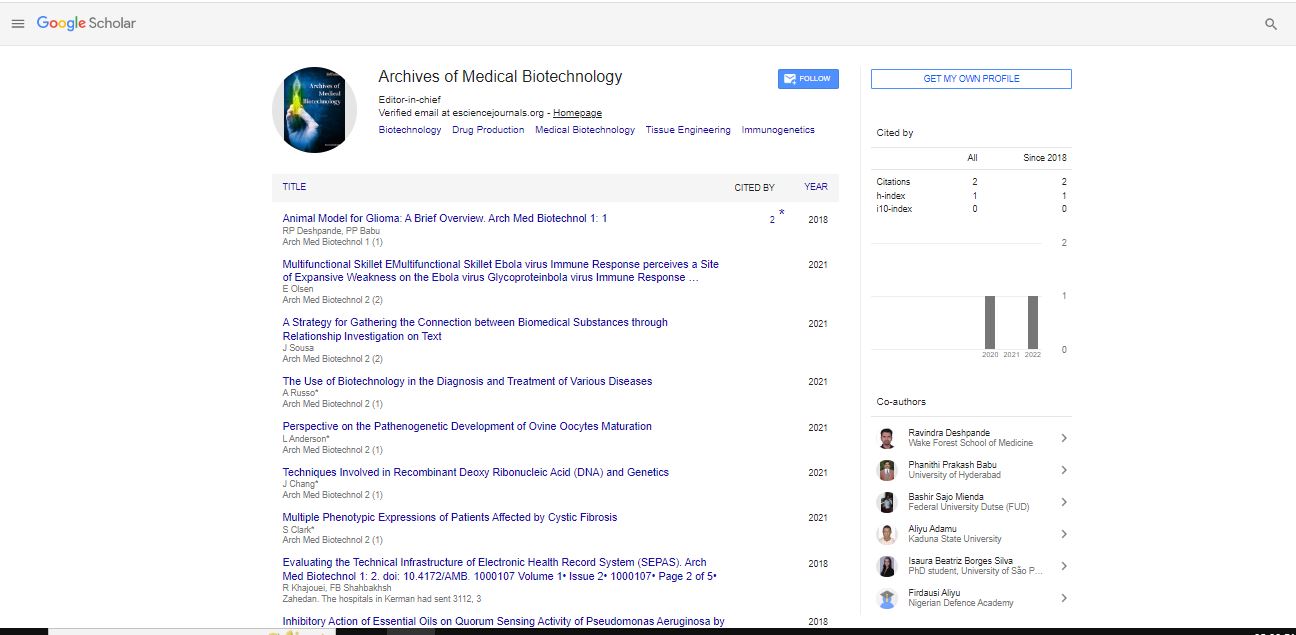Opinion Article, Arch Med Biotechnol Vol: 4 Issue: 2
Molecular Diagnostics: Exploring the Genetic Landscape of Cancer
Jahson Mayer*
Department of Neurology and Program in Neuroscience, Uniformed Services University of the Health, United States of America
*Corresponding Author: Jahson Mayer,
Department of Neurology and Program
in Neuroscience, Uniformed Services University of the Health, United States of America;
E-mail: mayerj@aberdeen.ac.edu
Received date: 22 May, 2023, Manuscript No. AMB-23-106368;
Editor assigned date: 24 May, 2023, PreQC No. AMB-23-106368 (PQ);
Reviewed date: 16 June, 2023, QC No. AMB-23-106368;
Revised date: 26 June, 2023, Manuscript No. AMB-23-106368 (R);
Published date: 03 July, 2023 DOI: 10.4172/amb.1000048.
Citation: Mayer J (2023) Molecular Diagnostics: Exploring the Genetic Landscape of Cancer. Arch Med Biotechnol 4:2.
Abstract
Early and accurate diagnosis of cancer plays a crucial role in improving patient outcomes. Providing an overview of the recent advances in diagnostic techniques for cancer detection, by exploring various imaging modalities, such as Computed Tomography (CT), Magnetic Resonance Imaging (MRI), and Positron Emission Tomography (PET), and their applications in cancer diagnosis. The manuscript also discusses the emerging role of liquid biopsies, molecular diagnostics, and Artificial Intelligence (AI) in cancer detection. These advancements have the potential to enhance cancer diagnosis, enable personalized treatment strategies, and improve patient survival rates.
Keywords: Magnetic Resonance Imaging; Artificial Intelligence; Tomography
Description
Cancer is a leading cause of morbidity and mortality worldwide, emphasizing the need for early detection and accurate diagnosis. Traditional diagnostic approaches, such as tissue biopsies and imaging studies, have been valuable in cancer detection. However, recent advancements in diagnostic techniques have expanded our capabilities, enabling earlier detection, improved characterization, and personalized treatment strategies.
Imaging Modalities
Medical imaging plays a crucial role in cancer diagnosis and staging. Computed Tomography (CT) uses X-rays to create detailed cross-sectional images of the body, allowing the detection and localization of tumors. Magnetic Resonance Imaging (MRI) utilizes magnetic fields and radio waves to generate high-resolution images, providing detailed anatomical and functional information. Positron Emission Tomography (PET) combines molecular imaging with radioactive tracers to visualize metabolic activity in tumors, aiding in diagnosis and treatment planning.
Liquid biopsies
Liquid biopsies involve the analysis of various biomarkers, such as circulating tumor DNA (ctDNA) and Circulating Tumor Cells (CTCs), found in bodily fluids like blood and urine. These non-invasive tests offer potential advantages over traditional tissue biopsies, providing real-time monitoring of tumor dynamics and enabling early detection of cancer recurrence. Liquid biopsies also hold promise in guiding treatment decisions and monitoring treatment response.
Molecular diagnostics
Molecular diagnostic techniques have revolutionized cancer diagnosis by enabling the identification of specific genetic and molecular alterations associated with cancer. Techniques such as Polymerase Chain Reaction (PCR), Fluorescence In Situ Hybridization (FISH), and Next-Generation Sequencing (NGS) allow for the detection of specific mutations, gene amplifications, and chromosomal rearrangements. These tests aid in tumor classification, identification of therapeutic targets, and prediction of treatment response.
Artificial Intelligence (AI)
AI has emerged as a powerful tool in cancer diagnosis, leveraging machine learning algorithms to analyze large datasets and identify patterns that may not be apparent to human observers. AI can assist radiologists in image interpretation, improving accuracy and efficiency in cancer detection. It can also analyze molecular data and clinical records to provide personalized treatment recommendations based on individual patient characteristics.
Challenges and future perspectives
While diagnostic advancements offer great promise, several challenges need to be addressed. Standardization and validation of new techniques, accessibility to advanced diagnostic tools, and integration of multiple modalities into clinical workflows are essential for their widespread adoption. Additionally, the ethical implications of using AI in healthcare, patient privacy, and data security must be carefully considered.
Conclusion
Recent advancements in diagnostic techniques have significantly improved our ability to detect and diagnose cancer. Imaging modalities, liquid biopsies, molecular diagnostics, and AI-based approaches offer new avenues for early detection, accurate characterization, and personalized treatment strategies. Continued research, technological advancements, and interdisciplinary collaborations are crucial for translating these innovations into clinical practice, ultimately improving patient outcomes and survival rates.
 Spanish
Spanish  Chinese
Chinese  Russian
Russian  German
German  French
French  Japanese
Japanese  Portuguese
Portuguese  Hindi
Hindi 